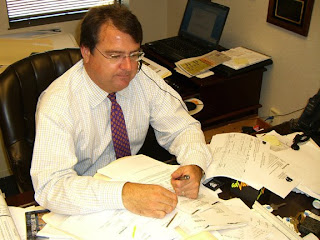
 Junior Achievement of Southwest Virginia has named two new laureates for the 20th annual Southwest Virginia Business Hall of Fame. They are Anna Logan Lawson, former owner and director of Frigid Freeze and T. Marshall Hahn, former president of Virginia Tech University and former President of Georgia-Pacific.
Junior Achievement of Southwest Virginia has named two new laureates for the 20th annual Southwest Virginia Business Hall of Fame. They are Anna Logan Lawson, former owner and director of Frigid Freeze and T. Marshall Hahn, former president of Virginia Tech University and former President of Georgia-Pacific.The induction is Monday, Nov. 1 at the Hotel Roanoke & Conference Center. Tickets are $100 each.
Lawson, 66, spent 12 years on the board of Frigid Freeze Foods, a frozen food distributorship in Salem, where she acted as corporate secretary for most of her tenure. She is a founding organizer/director of Valley Financial Corporation and Valley Bank, where she chaired the ALCO Oversight Committee for 15 years, and now chairs the Human Resources and Nominating Committees.
In the non-profit arena, she has held writing and editorial positions at Hollins College and the Kettering Foundation in Ohio.
She has served on several non-profit boards, including four which she had chaired in recent years, including Total Action Against Poverty, Hollins University, The Nature Conservancy-Virginia Chapter and the Virginia Foundation for the Humanities. She has served as a director or trustee of Virginia Environmental Endowment, Virginia Land Conservation Foundation, The Nature Conservancy-Virginia Chapter, Virginia Foundation for the Humanities, Art Museum of Western Virginia (Taubman Museum), and the Rice Center for Environmental Studies at Virginia Commonwealth University.
Lawson received her B.A. and M.A. degrees from Hollins and Ph.D from the University of Virginia.
Born in 1926, Thomas Marshall Hahn Jr. was President of Tech from 1962 to 1974 and Director of Georgia Pacific from 1983 to 1993. The Kentucky native graduated from the University of Kentucky in 1945 and became a physicst for U.S. Naval Ordnance Laboratory. He earned his Ph.D. at MIT in 1949 and served there as a a research assistant at MIT, beginning in 1947.
He worked for UK as a physics professor then, in 1954, went to Tech as head of the Department of Physics. He was the leading force in establishing a doctoral program in nuclear engineering physics at VPI, and in the acquisition of the nuclear reactor simulator that was put into operation in 1957.
Hahn was instrumental in the Virginia Tech's transition from a largely military and overwhelmingly white and male technical institute focused on agriculture and engineering to a coeducational, multiracial research university with a thriving college of arts and sciences and burgeoning graduate program. During his tenure Virginia Tech tripled in size. Student unrest during the Vietnam War targeted Hahn and he served until 1974.
He became chief executive officer of the Georgia-Pacific Corp. Hahn's tenure as CEO of Georgia Pacific from 1983 to 1993 included the boom years for the paper industry and the GNN takeover. The latter was one of Hahn's strategic decisions to build the paper side of Georgia Pacific's business.
He was chairman of the Salvation Army National Capitol and Virginia Divisional advisory board, 1972-74; chairman, Virginia Cancer Crusade, 1972; member, Virginia State Board of Agriculture and Commerce, 1962-74; member, board of visitors, Ferrum Junior College, 1966-74; cresident, Southern Association of State Universities and Land-Grant Colleges; and member, Governor of Virginia's Commission on Status of Women, 1964-66.
His directorships also included the board of control of Southern Regional Education Board; First National Exchange Bank of Virginia; The Lane Company; Dominion Bankshares, Inc.; Roanoke Electric Steel Corporation, and Shenandoah Life Insurance Company.
Established in 1990 by the Board of Directors of Junior Achievement of Southwest Virginia, the Business Hall of Fame honors leaders of the free enterprise system who serve as business role models for our region’s youth.
Laureates for induction into the Southwest Virginia Business Hall of Fame are chosen based on their outstanding leadership in the free enterprise system and business success as well as contributions and involvement in the community. A committee of their peers, distinguished business leaders in our area, selects laureates. Inductees must be retired or no longer occupy the position in which their principal business contributions were made.


























